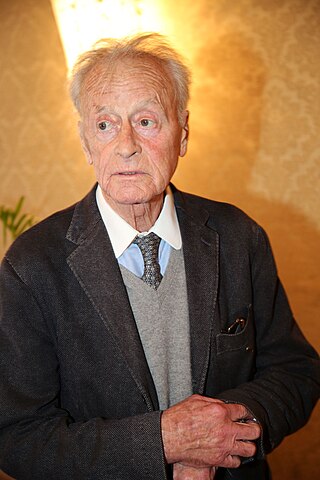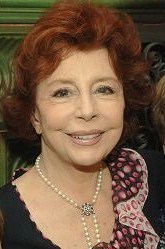
The Salzburg Festival is a prominent festival of music and drama established in 1920. It is held each summer, for five weeks starting in late July, in Salzburg, Austria, the birthplace of Wolfgang Amadeus Mozart. Mozart's operas are a focus of the festival; one highlight is the annual performance of Hofmannsthal's play Jedermann (Everyman).

Christiane Hörbiger was an Austrian stage, film, and television actress. Her first major film role was Mary Vetsera in Kronprinz Rudolfs letzte Liebe in 1955. She appeared on the stage of the Burgtheater as Recha in Lessing's Nathan der Weise in 1959, became a member of Theater Heidelberg and later Schauspielhaus Zürich. From 1969 to 1972, she portrayed Die Buhlschaft in Hofmannsthal's Jedermann at the Salzburg Festival.

Hannelore Elsner was a German actress with a long career in television and film. She first performed on stage in Munich, and later starred in popular films and television series such as Die Schwarzwaldklinik, and as the lead character, Inspector Lea Sommer, in the series Die Kommissarin. She was recognized internationally for her lead role in the 2000 film Die Unberührbare, shown at the Cannes Film Festival.

Bernhard Wicki was an Austrian-Swiss actor, film director and screenwriter. He was a key figure in the revitalization of post-war German-language cinema, particularly in West Germany, and also directed several Hollywood films.

Bibiana Beglau is a German actress.

Helmuth Lohner was an Austrian actor, theatre director, and from 1997 to 2006 director of the Theater in der Josefstadt.

Nadja Tiller was an Austrian actress in film, television, and on stage. She was one of the most popular German-speaking actresses in the international cinema of the 1950s and 1960s, receiving international recognition when she played the title role in the 1958 film Das Mädchen Rosemarie (Rosemary) in 1958, shown at the Venice Film Festival. It opened the way to international films. She often played alongside her husband, Walter Giller.

Christine Buchegger was an Austrian theater and television actress, born in Vienna, Austria.

Marianne Koch is a German actress of the 1950s and 1960s, best known for her appearances in Spaghetti Westerns and adventure films of the 1960s. She later worked as a television host and as a physician.

Jedermann. Das Spiel vom Sterben des reichen Mannes is a play by the Austrian playwright Hugo von Hofmannsthal. It is based on several medieval mystery plays, including the late 15th-century English morality play Everyman. It was first performed on 1 December 1911 in Berlin, directed by Max Reinhardt at the Circus Schumann. Since 1920, it has been performed regularly at the Salzburg Festival.

Ruth Leuwerik was a German film actress, one of the most popular stars of German film during the 1950s. She appeared in 34 films between 1950 and 1977. Leuwerik is probably best known for her portrayal of Maria von Trapp in the films The Trapp Family and The Trapp Family in America.

Edith Käthe Elisabeth Schultze-Westrum was a German film actress. She appeared in more than 60 films between 1932 and 1979. These included the role of Mrs. Hudson in the 1962 film Sherlock Holmes and the Deadly Necklace.
Alma Seidler was an Austrian actress. She was member of the Burgtheater for over 50 years.

Johanna von Koczian was a German actress. She grew up in Salzburg where Gustaf Gründgens offered her a role at the 1951 Salzburg Festival, and she played at several German theatres. She had her first film role in the 1957 film Victor and Victoria, and her breakthrough a year later in Wir Wunderkinder which earned her a German Film Award. She was named "the German Audrey Hepburn" then. She appeared in many films, also on television, became popular again as a singer with the 1977 hit "Das bißchen Haushalt", presented television series and authored books for children and youths. She returned to the stage for comedies such as Glorious!, performed with great success in Berlin in 2010.

Sonja Alice Selma Toni Ziemann was a German film and television actress. In the 1950s, she was among Germany's most prominent actresses, awarded the 1950 Bambi for appearing, together with Rudolf Prack, in Schwarzwaldmädel. From the 1960s, she turned to more serious acting in international films such as The Secret Ways. She played in several anti-war films such as Strafbataillon 999. She also appeared on stage and in television.
Erica Beer was a German film actress. She was born in Munich.
Jedermann is a 1961 Austrian drama film directed by Gottfried Reinhardt, based on the 1911 play of the same title written by Hugo von Hofmannsthal. The film was submitted as the Austrian entry for the Best Foreign Language Film at the 34th Academy Awards, but it was not selected as one of the five nominees in the category.

Gunnar Möller was a German television and film actor. He appeared in over 160 film and television productions between 1940 and 2016. He was most successful as a leading man in German cinema of the 1950s, especially with his role in I Often Think of Piroschka (1955) with Liselotte Pulver. He later turned to character roles and worked for a number of years in England, including the supporting role of Hans van Broecken in World War II drama series Secret Army.

Philipp Hochmair ; born 16 October 1973) is an Austrian theater, film and television actor.

Verena Altenberger is an Austrian actress.

















